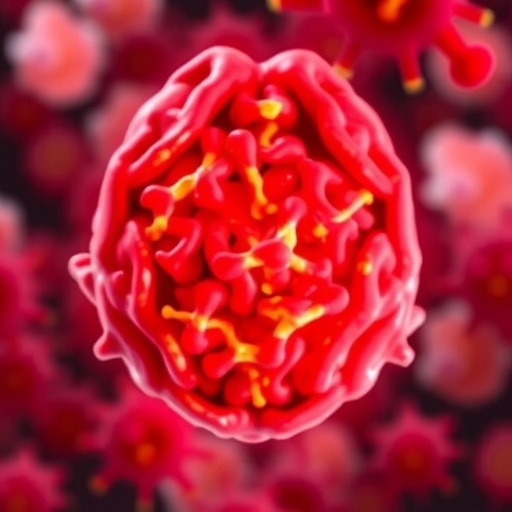A groundbreaking study has emerged from the intersection of pediatric neurology and immunology, shedding light on the vital relationship between inflammasome proteins in the serum and the severity of traumatic brain injury (TBI) in children. Published recently in Pediatric Research, this investigation opens new vistas for understanding the molecular mechanisms underpinning brain injury responses in the pediatric population, aiming to improve both diagnostics and therapeutic interventions for a condition that remains a leading cause of disability and death globally.
Traumatic brain injury in children represents a major public health challenge, characterized by considerable heterogeneity in presentation, pathophysiology, and outcomes. Traditionally, assessment of injury severity has relied on clinical and radiological parameters, which do not sufficiently capture the complex biological responses that dictate prognosis. This new research pivots towards intrinsic molecular markers—specifically inflammasome proteins—a critical component of the innate immune system that orchestrates inflammatory cascades following neural insult.
Inflammasomes are multi-protein intracellular complexes that detect pathogenic microorganisms and sterile stressors, triggering inflammatory cytokine production and cell death mechanisms. Their activation in the brain following trauma can either be a double-edged sword—facilitating repair or exacerbating secondary injury through neuroinflammation. The study conducted by Munoz Pareja and colleagues meticulously quantified serum levels of key inflammasome proteins in pediatric patients presenting with varying TBI severities, establishing compelling correlations that could revolutionize clinical practice.
Utilizing cutting-edge immunoassays, the researchers measured concentrations of inflammasome components such as NLRP3, ASC, and caspase-1 in the bloodstream shortly after injury. Elevated serum levels were consistently associated with increased injury severity, as classified by standard scales including the Glasgow Coma Scale (GCS). This direct relationship underscores the potential of inflammasome proteins as minimally invasive biomarkers capable of providing real-time insights into the underlying neuroinflammatory state.
One of the critical insights gained from this study is the temporal dynamics of inflammasome protein expression. The team observed that peak levels occurred within the first 24 to 48 hours post-injury, a crucial window when secondary brain damage due to inflammation is most pronounced. This temporal pattern highlights a possible therapeutic target timeframe during which modulation of inflammasome activity could mitigate deleterious neuroinflammatory responses, potentially improving neurological outcomes.
The researchers further explored how these inflammatory markers correlate with long-term clinical sequelae. Pediatric patients exhibiting elevated inflammasome proteins in the acute phase were more likely to develop complications such as cerebral edema, post-traumatic seizures, and cognitive impairments. These findings suggest that inflammasome profiling may serve not only as a prognostic tool but also as a guide for tailoring personalized treatment strategies to ameliorate chronic disability.
It is important to recognize the unique aspects of the pediatric brain, which possesses distinct immunological and developmental characteristics compared to adults. The study emphasizes that children’s neuroimmune responses post-TBI are nuanced and may differ significantly, making age-specific investigations indispensable. The inclusion of a pediatric cohort marks a significant advancement, as much of the inflammasome research to date has focused on adult populations.
From a mechanistic perspective, the activation of inflammasomes follows cellular damage signals such as mitochondrial dysfunction, ionic fluxes, and the release of damage-associated molecular patterns (DAMPs) following TBI. The consequent production of interleukin-1β and interleukin-18 cytokines amplifies inflammation and recruits immune cells, exacerbating tissue injury if uncontrolled. Understanding these cascades in pediatric patients lends itself to the development of pharmacological inhibitors that selectively attenuate inflammasome signaling without compromising host defenses.
Interestingly, this study’s findings dovetail with emerging evidence that links inflammasome activity to blood-brain barrier integrity disruption, a hallmark of TBI pathology. Increased serum inflammasome proteins might reflect both central and peripheral immune activation, indicating crosstalk between systemic and central nervous system inflammation. This integrative perspective broadens the scope for biomarker development encompassing multi-faceted immune responses.
The translational implications of this research are profound. Incorporating inflammasome protein measurement into clinical workflows could enable rapid stratification of TBI severity, guiding decisions regarding intensive monitoring, imaging, and early therapeutic interventions. Furthermore, inflammasome-modulating agents, some of which are in preclinical or early clinical trials, could be repurposed for pediatric TBI—ushering in an era of targeted neuroimmune therapies.
Equally important is the potential to reduce the burdensome societal and economic impacts of pediatric brain injury. By predicting injury severity and trajectories more accurately, healthcare systems can optimize resource allocation and enhance rehabilitation efforts, ultimately improving quality of life for affected children and their families.
While this investigation presents a promising frontier, the authors caution that larger multicentric studies are warranted to validate findings across diverse populations and elucidate the exact mechanisms at play. Integrating inflammasome protein analysis with other biomarkers and neuroimaging data might enhance predictive accuracy and deepen pathophysiological understanding.
In conclusion, the study by Munoz Pareja et al. represents a paradigm shift in pediatric TBI research by illuminating the pivotal role of serum inflammasome proteins as biomarkers closely linked to injury severity. This innovative approach opens avenues for novel diagnostic and therapeutic strategies against the backdrop of a complex neuroinflammatory milieu. As science continues to unravel the intricate dialogues between the immune system and the injured brain, pediatric patients stand to benefit from more precise, tailored, and effective care.
With the ongoing evolution of neuroimmunology and molecular diagnostics, the integration of inflammasome profiling into pediatric trauma care highlights a milestone in personalized medicine. Future research building upon these insights holds the promise of transforming clinical outcomes and mitigating the long-term consequences of traumatic brain injury in children worldwide.
Subject of Research: Pediatric Traumatic Brain Injury and Serum Inflammasome Proteins
Article Title: Association of serum inflammasome proteins and pediatric traumatic brain injury severity
Article References:
C. Munoz Pareja, J., Mateo Chavez, M.B., Bernal, J.A. et al. Association of serum inflammasome proteins and pediatric traumatic brain injury severity. Pediatr Res (2025). https://doi.org/10.1038/s41390-025-04410-5
Image Credits: AI Generated
DOI: https://doi.org/10.1038/s41390-025-04410-5
Tags: biomarkers for brain injurydiagnostics for pediatric TBIinflammatory cytokine productioninnate immune response in TBImolecular mechanisms of TBIneuroinflammation in childrenpediatric neurology researchpediatric traumatic brain injurypublic health challenges in pediatric TBIserum inflammasome proteinsseverity of brain injurytherapeutic interventions for brain injury





